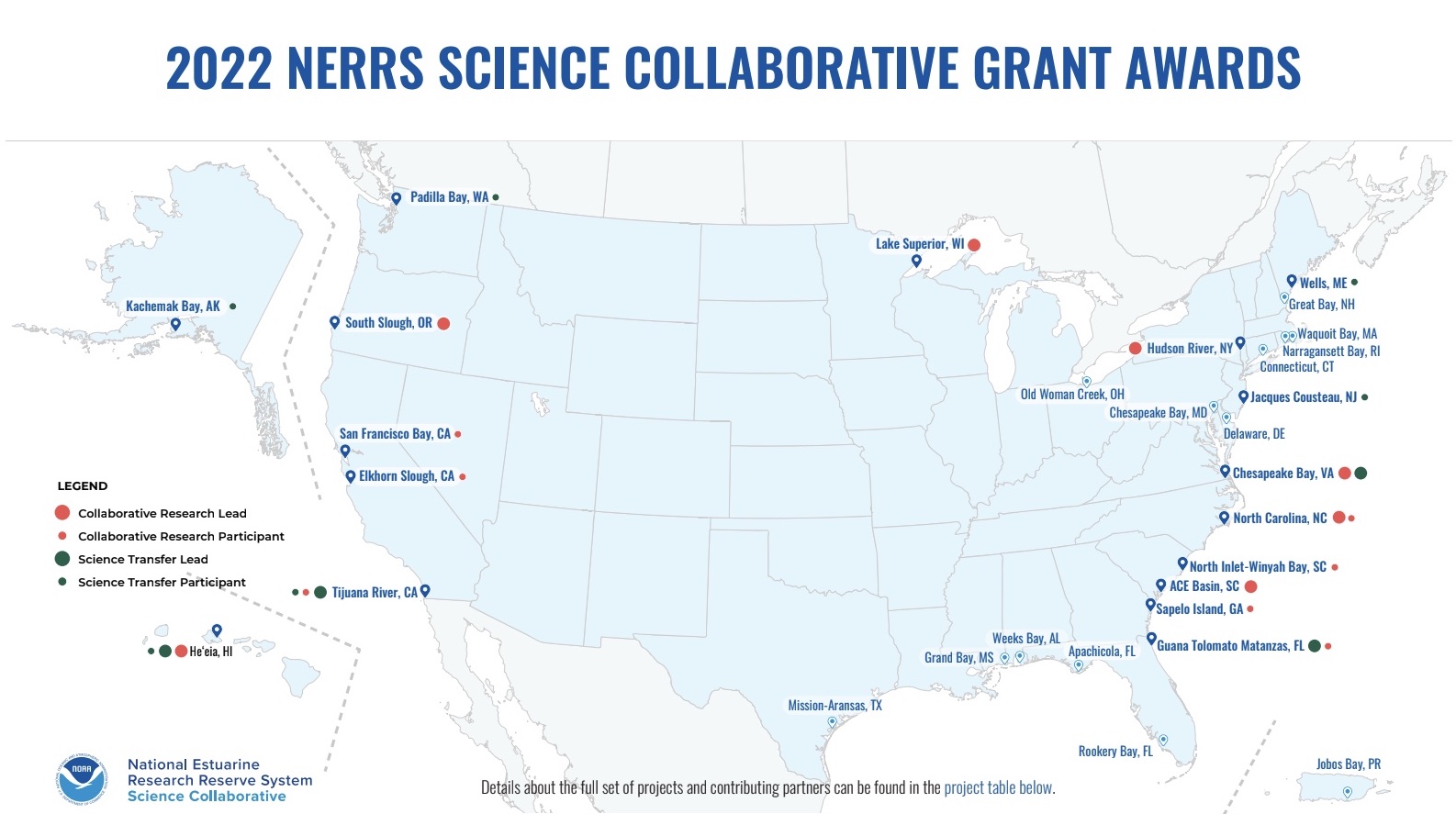Eleven projects involving 17 reserve sites across the nation and totaling more than $3 million have been recommended for support by NOAA’s National Estuarine Research Reserve System (NERRS) Science Collaborative, managed by the University of Michigan Water Center.
This funding cycle’s projects fall into two categories: collaborative research and science transfer. Collaborative research projects conduct new applied science through a user-driven, collaborative process that results in research, data, tools, or other products that will inform decision-making related to a reserve management need. Science transfer grants support the transfer of existing information, approaches, and techniques to support reserve activities and programs across all reserve sectors.
The projects recommended for funding will tackle a variety of active and emerging coastal issues, many directly related to climate change. Topics include furthering our understanding of coastal ecosystem services; planning for flood resilience; monitoring oyster reef conditions; incorporating Indigenous knowledge into watershed management; enhancing science literacy; and addressing marine debris.
“These projects demonstrate the power of these place-based reserves whose strong relationships with their communities help them identify and pursue this highly impactful work,” said Dr. Jennifer Read, Director of the University of Michigan Water Center and the NERRS Science Collaborative. “We are delighted to support the researchers, practitioners, and partners across the reserve system working together to undertake this important, local but highly transferable work.”
All Science Collaborative projects integrate decision-makers and other end users to ensure that products address current coastal management issues. Over the course of the project period, teams have access to Science Collaborative support and resources, including experts in collaborative research design and implementation, and data management.
This is the third year of a $20 million, five-year cooperative agreement with the University of Michigan, which administers the program. New for this year: guidance for the review panels on how to recognize traditional ecological and Indigenous knowledge in proposals.
- See a list and map of the new projects, including a summary of each project (PDF)
- Learn more about the NERRS Science Collaborative
- Explore products and tools produced by the NERRS Science Collaborative, including the new Guide to Collaborative Science
.png) | ||
|---|---|---|
2022 Science Collaborative Funded Projects |
| Project Lead and Affiliation | Project Title | Participating Reserve(s) |
| COLLABORATIVE RESEARCH | ||
| Celso Castro-Bolinaga, North Carolina State University | Improved Understanding of Sediment Dynamics for the Rachel Carson Reserve, North Carolina | North Carolina (NC) |
| Christopher Janousek, Oregon State University | A Long-Term Perspective on Tidal Wetland Restoration: Vegetation Development, Elevation Capital, and Carbon Sequestration in the Oldest Projects along the West Coast | South Slough (OR); Tijuana River (CA); Elkhorn Slough (CA); San Francisco (CA) |
| Jessie Jarvis, University of North Carolina Wilmington | Evaluating and Enhancing Eelgrass Resiliency and Restoration Potential in a Changing Climate | Chesapeake Bay (VA) |
| Peter Kingsley-Smith, South Carolina Department of Natural Resources | Collaborative Development of Novel Remote Sensing Workflows for Assessing Oyster Reef Condition to Inform Management and Restoration | ACE Basin (SC); North Inlet-Winyah Bay (SC); North Carolina (NC); Sapelo Island (GA); Guana Tolomato Matanzas (FL) |
| Hannah Ramage, University of Wisconsin–Madison | Building a Collaborative Water Quality Monitoring Strategy for a Changing St. Louis River Estuary | Lake Superior (WI) |
| Aaron Rice, Cornell University | Leveraging Conservation Technology to Improve Protected Species Management Efforts and Enhancing Ecosystem Services within the Hudson River National Estuarine Reserve | Hudson River (NY) |
| Yoshimi Rii, Heʻeia National Estuarine Research Reserve | Wetland Water and ʻIke (WAI): Improving Understanding of Hydrology to Inform Management Decisions | Heʻeia (HI) |
| SCIENCE TRANSFER | ||
| Kristen Goodrich, Tijuana River National Estuarine Research Reserve | Transferring Knowledge to Understand the NERRS’s Niche in Addressing Aquatic-Bound Debris | Tijuana River (CA); Heʻeia (HI); Padilla Bay (WA) |
| Geraldine Klarenberg, University of Florida | Using Collaborative Open Science Tools to Improve Engagement with the Ecology of the Guana River Estuary | Guana Tolomato Matanzas (FL) |
| Sarah Nuss, Virginia Institute of Marine Science | Virginia Scientists and Educators Alliance (VA SEA) & Partners | Chesapeake Bay (VA); Jacques Cousteau (NJ) |
| Eleanor Sterling, Hawaii Institute of Marine Biology | Reciprocal Relationships in Reserves: Establishing a Community of Practitioners for Identifying and Using Cultural Ecosystem Services Approaches | Heʻeia (HI); Kachemak Bay (AK); Wells (ME); Tijuana River (CA) |
.png) | View/Download as a PDF | |
